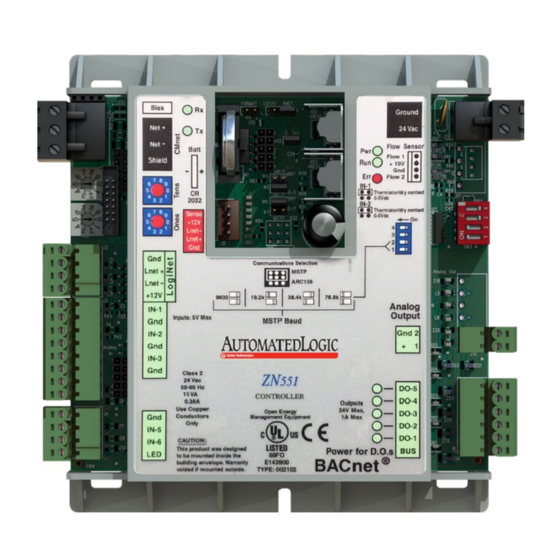Automated Logic ZN551 Technical Instructions - Page 2
Browse online or download pdf Technical Instructions for Network Router Automated Logic ZN551. Automated Logic ZN551 18 pages. Control module

What is the ZN551 control module?
Module driver and
control program
Specifications
ZN551 Control Module • Rev. 3/17/2005
The ZN551 control module is used for zone control.
Module driver
Maximum number of control
programs
Maximum number of
BACnet objects*
* Depends on available memory
Power
CMnet port
Rnet port
LStat port
Local access port
Inputs
Input resolution
Digital outputs
Analog output
Output resolution
Memory
Battery
Protection
2
DRV_ZN
1
200
24 Vac ±10%, 50–60 Hz, 15 VA
26 Vdc (25 V min, 30 V max)
For communication with the control module network using
ARC156 or MS/TP (9600 bps–76.8 kbps)
For RS room sensors. The Rnet port supports up to four
RS sensors and one RS Pro or RS Plus sensor for
averaging or high/low select control.
NOTE The ZN551 does not support BACview.
For LogiStat and LogiStat Plus room sensors. The LogiStat
port uses two universal inputs.
NOTE The ZN551 does not support the LogiStat Pro. Use
an RS Pro on the Rnet port instead.
For system start-up and troubleshooting
5 inputs configurable for thermistor or dry contact. Inputs
1 and 2 are also configurable for 0–5 Vdc. Inputs 4 and 5
are used when a LogiStat sensor is connected, but are
available if an RS room sensor is connected.
10 bit A/D
5 digital outputs, relay contacts rated at 1 A max. @ 24
Vac/Vdc. Configured normally open.
1 analog output, 0–10 Vdc (5 mA max)
8 bit D/A
512 kB non-volatile battery-backed RAM, 1 MB Flash
memory, 16-bit memory bus
10-year Lithium CR2032 battery provides a minimum of
10,000 hours of data retention during power outages
Incoming power and network connections are protected
by non-replaceable internal solid-state polyswitches that
reset themselves when the condition that causes a fault
returns to normal. The power, network, analog inputs,
analog outputs, and relay output connections are also
protected against voltage transient and surge events.
© 2005 Automated Logic Corporation
